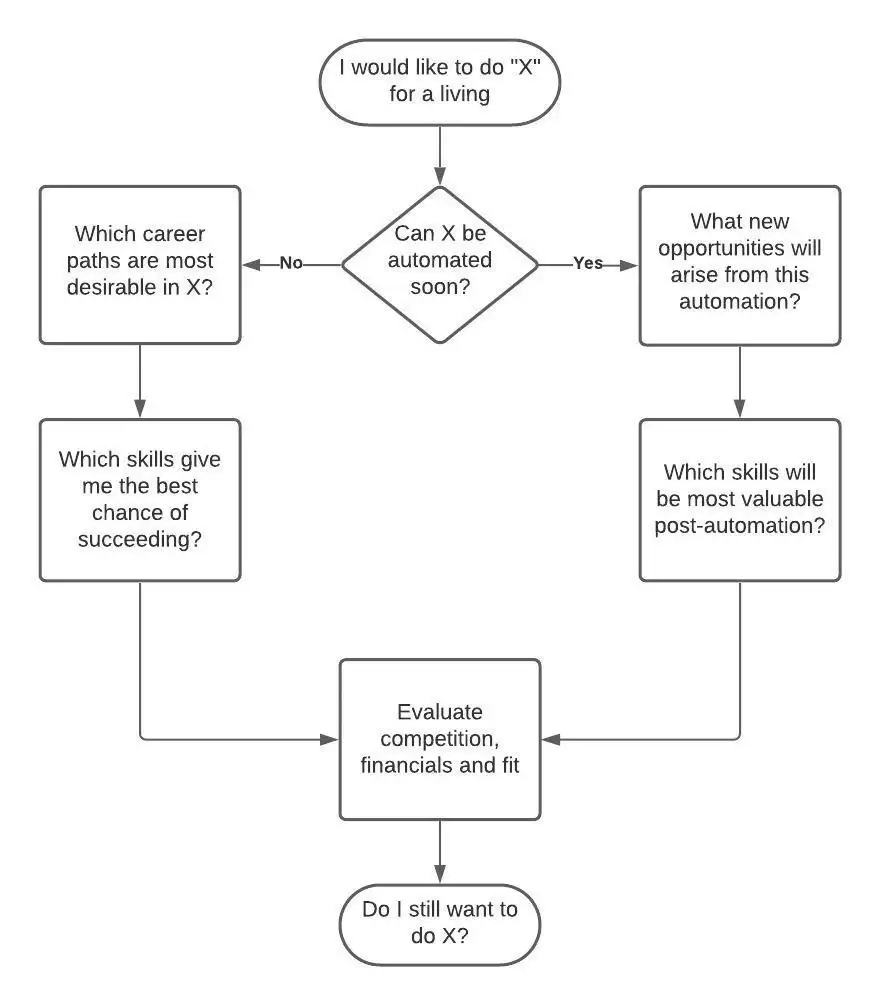
How many times have you heard a sentence that started with the words “I wish I had…”? College graduates wish they had understood how the world works before they chose their majors (or, indeed, whether to attend university at all). Middle-aged men and women wish they had chosen this industry over that.
Everybody has 20/20 hindsight, but peering into the future is a completely different animal. For my young readers, there is no better use of your time than to try to understand two things:
- Which industries will blossom in the coming decades
- Which skills will be required within those industries
The automation framework
When trying to imagine the future today, the keyword is automation. You don’t want to be the guy training to drive a horse carriage the year before cars are invented. Once you start considering the implications of automation, your mind might swirl, and with good reason. But, is there an algorithm that can help us tackle this problem? The answer is yes.

For example, let’s say your first thought is: I want to build websites for a living. That’s great. Now, will web development be automated soon? It already has been, to a great extent. There are plenty of ways to build a web store, presentation, or landing page without writing a line of code.
So, what opportunities will arise from that? If you learn to use a good website building tool better than most people, you can excel and get a lot of projects done quickly. Add to that some coding skills and some design knowledge, and you have yourself a decent career in the making.
What can't be automated?
But, can you do better? Yes, you can, by focusing on what can’t be automated. For now, solving complex problems with code can’t be automated. A website builder can generate a web page, but it can’t generate, for example, a stock market analysis platform. Even if artificial intelligence grows so clever that it can code anything, it will still need to first understand what it is that the client wants to build. “Build a stock market analysis platform” is not a viable command for a machine. You need to provide exceedingly detailed project specifications before even the smartest robot can begin to comprehend what it needs to do. Even then, it’s not enough. If there is one thing experienced software developers know, it is this: no project spec is ever good enough. Every specification document needs to be discussed, revised, revamped, refactored and, sometimes, tossed out to be replaced with something that makes sense. So, where does that bring us in our career quest? Project management, creativity, and communication are more things that are difficult to automate and therefore have a future.
But wait, the rabbit hole goes deeper. What if computer-brain interfaces become very advanced in the next couple of decades? This could spell the end of the middle-man. The moment thoughts can be translated into code is the moment that programming dies. The good news is, I highly doubt that this will be a problem for your generation. If and when it does, it will open some amazing doors — new possibilities, new products, new ideas, and entirely new modes of living. Jobs will never disappear unless the economic need for people to work disappears.
Your industry matters
The entire flow of thought above can be modified for your desired industry. List the jobs you would like to have within this industry, then walk through the algorithm, step by step. Eliminate the jobs that are likely to be an automation dead-end, compare the others, and make an informed decision for the robot era.
Not all industries are created equal, however. Areas such as space exploration, energy, and robotics will be the focal points of the upcoming decades. Space-related business in particular is likely to take off (no pun intended) at an unpredictable pace, which might just catch most of us off-guard. From relatively simple space tourism to very un-simple asteroid mining, there is a myriad of star-lit ventures we will have the pleasure of observing in the coming decades. Some of you will have the pleasure of participating in them, and some within that group will make fortunes.
As a parting thought, keep this in mind: what is happening now is nothing new. Ever since the beginning of the industrial age, automation has been destroying jobs and creating new ones. We all have to deal with it one way or another. The only choice is: do you want to be prepared to work with robots, or do you want to try to fight them?
Don't miss the next blog post!
I publish a new blog post every Wednesday. Join the newsletter to get:
- One valuable email a week.
- Zero spam.
- Exclusive content not found in the blog.
- Reply directly to me with questions or feedback.
Use the form at the bottom of this pageon the right to join the newsletter.


